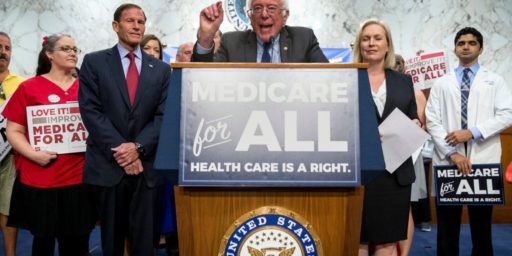Health Care Debate’s Ecological Fallacy
Kevin Drum argues, correctly I think, that British- and Canadian-style socialized medicine is not on the table in the United States and that we should therefore frame the debate in terms of a French- or Dutch-style mixed system. He further cites Jonathan Cohn‘s argument that these systems are quite good.
But in the course of a few dozen lengthy interviews, not once did I encounter an interview subject who wanted to trade places with an American. And it was easy enough to see why. People in these countries were getting precisely what most Americans say they want: Timely, quality care. Physicians felt free to practice medicine the way they wanted; companies got to concentrate on their lines of business, rather than develop expertise in managing health benefits. But, in contrast with the US, everybody had insurance. The papers weren’t filled with stories of people going bankrupt or skipping medical care because they couldn’t afford to pay their bills. And they did all this while paying substantially less, overall, than we do.
Kevin concludes,
Now, the fact that the French spend about half what we do doesn’t mean that we’d cut our costs in half if we adopted a French-style system. We wouldn’t. There’s too much path dependence and too many cultural differences for that. But what it does mean is that if we adopted something close to their system, we could certainly achieve high-quality 100% basic coverage — with the ability to purchase extra coverage for anyone who wants it — for no more than we spend now and possibly a bit less.
We won’t, of course, because too many people are still convinced that healthcare in the United States is better than it is in France — or anywhere else. It’s not. It’s worse and more expensive.
While I’m for a variety of reasons skeptical that an American system modeled on the French and Dutch systems would work quite so efficiently, I tend to agree that in the aggregate, such a system would be preferable to the crazy hodgepodge we have now. The combination of vast government programs like Medicare and Medicaid and the fact that most of us have private insurance and therefore only care about deductibles and co-pays means we don’t have anything close to a free market in medicine. And medicine wouldn’t be a truly free market even absent these institutions because being extremely sick rather limits one’s negotiating power.
But here’s the thing: most of us aren’t viewing this debate in the aggregate but rather as individuals. Most of us have the sense that ourselves and our families would be worse off in a system where the government was even more influential and even more people were free riding. Statistics about national level costs and outcomes don’t address that concern.
UPDATE: Dave Schuler has much more at his place.
Bernard Finel argues, persuasively, that what “most people” think about something is not necessarily something we should base public policy decisions on, citing several good examples.
He’s right, of course, that the majority sentiment on complicated public policy issues can be mistaken. Many times it is.
Could this be one of them? Perhaps.
But this is ultimately a problem where most people can in fact reasonably judge because it’s a personal-level decision. Most of us have insurance and can afford to go to the doctor and get the treatment we want. Some insured patients have HMOs or PPOs with various restrictions but those, too, are usually judgable by non-experts. (The exception being exclusions that kick in rarely at catastrophic times.)
Speaking for myself, I’m not and never have been ideologically opposed to the concept of a government-administered health system. Even going back to my days in College Republicans, I believed that medical care shouldn’t be one of the things controlled by how financially successful you are. Nor do I necessarily believe Americans enjoy “the best health care in all the world” at the aggregate level.
But I’m extremely risk averse a major overhaul of the system because most of us enjoy access to great health care and an extraordinary amount of autonomy in choosing how we want it delivered to us. We would trade away some of each, especially the latter, under any comprehensive system administered by the state in exchange for a massive gain for those who are now uncovered or undercovered.






I would also want to see if there is any rationing under the Dutch/French type systems. Or to put it another way, would Obama have to seek healthcare outside of the system for his family.
As I understand it, both systems have private care physicians available “outside” the system.
Under our system roughly 50-60% of healthcare spending is government spending. Under the French system it’s 80-90%. The French have a hybrid system of public and private insurance with most employed Frenchmen carrying some form of private insurance.
Although their system is not technically a single-payer system, it’s a bit more in that direction than ours is.
I have seen some polls that say most people are in fact happy with the health insurance plans. Given that, it’s very easy to see why a majority of individuals remain unconvinced that the government plans are going to make things better. The government’s track record does nothing to discourage that belief.
Admittedly, I don’t know much about the French or Dutch systems, but I do know a little bit about Britain’s NHS. There is private care available there as well, but as I recall, it is limited by the government which in effect rations it out at a rate that puts it well beyond most people’s reach, merely accentuating the gap between the haves and the have-nots even further. Again, I have no idea if the same holds for the French or Dutch systems, but in general the American hodgepodge seems to be a good deal more egalitarian in its approach than most. In my experience living in several different urban areas, PPOs provide a tremendous selection of physicians and it is precisely this level of choice that many are “irrationally” afraid of losing under any government mandated plan — despite the protestations to the contrary. It’s kind of like the same sort of “irrational” fear many of us have when President Obama says no one making less than $250K will have their taxes raised, wink, wink.
It seems like the biggest grumbles we hear against having more government involvement in healthcare or the public option are from people who seem to already have good healthcare…I’d love to hear what people who are uninsured or underinsured have to say on this subject…
“as I recall, it is limited by the government”
You’d recall wrongly. I worked in the UK insurance industry for 20 years and can attest that private healthcare rates are very affordable and that private healthcare coverage is only limited by the insurers themselves. Around 12 million people in the United Kingdom are covered for private health care, a rate of some 20%.
Regards, Steve
Steve Hynd, sorry, that’s not exactly what I meant. I was thinking about doctors being limited to a percentage of their time outside the NHS. Again I could well have misremembered that as it has been over fifteen years now and will yield to your better information.
You left out “… and those who are going to have to foot the bill for everyone else’s free healthcare.”
Here’s an interesting article from 1992 about the problems doctors and insurance companies were having regarding fees and expenses between NHS and private care.
FYI: The Canadian system is not “socialized medicine.” The government just acts simply as an insurer. The bulk of medical care is done by private doctors who bill the province.
re: charles austin July 7, 2009 15:39
And how is that all that different from what we currently have? Many people who can’t afford health insurance use the emergency room as their “doctor” and those costs are passed on to everyone else…also, within the insurance system, isn’t it already the case that those who use less healthcare partially pay for those who use more…
A while back I asked you, James, how you define “socialized medicineâ€. We have to understand your antipathy to government sponsored health care to be able to hold valid discussions. And, we have to know what approaches you recommend to help overcome our current problems.
Our handy dandy Wikipedia may help you out. It has an extensive article on “Socialized Medicineâ€, which starts out this way:
The Wiki article goes on to further explore the term “Socialized Medicine†in the introductory paragraph by drawing this distinction:
Of course, if you want to raise the flag, blow the trumpet, and seek solace in wise words, you can always fall back on Conservapedia, which had this to say:
The rest of the introduction deals with wise words from President Ronald Regan. For those whose fun bone has not been jaded out of existence by constant harping on socialism, it is well worth a read. The italicized words in the definition of “Socialized Medicine†are links to other Coservapedia articles. I must say I enjoyed the definition of health care, to wit:
And under a heading titled Politics of health care, it has single entry, a quotation by Robert Moffitt, to wit:
Perhaps we can get some insight into your concerns about Socialized Medicine in your closing paragraph, to wit:
Free Riding no less, welcome to Uncle Reagan’s world, where Welfare Queens drive Cadillacs, and society has no debt to those workers and their children who cannot afford our inflated health insurance rate.
For those who are interested, that dreadful rag The New York Times had an interesting and well written article which covered in part the Dutch Health Care system. It is amusing and instructive, and well worth a read for those with open minds on health care.
Any chance I will ask James exactly what he means when he next uses the term “Socialized Medicineâ€?
And will I ever reach the ability to make my points in one sentence jabs, the way Dave Schuler (July 7, 2009 | 01:08 pm) does? Sigh, only the Shadow knows…
Full Disclosure: My daughter recently filled out a questionnaire from her health insurance company, to which she had contributed for more than 10 years. After the questionnaire was submitted her insurance policy was canceled. Insurance companies call this practice rescission. And because money is more important than the validity of a contract, they have testified in Congress that they will not give up this practice.
R. Paul Miller, MD
With all due respect, and I mean no disrespect towards your daughter for the difficult poistion she may find herself in now, but if the insurance company really violated their contract, sue them and you will probably win. I’m guessing the insurance company didn’t violate their contract, only your sense of what she was entitled by disregarding the fine print. I’m sure one of the reforms coming will eliminate rescission. At which point the insurance companies may just start folding up shop and we get a single payer plan by default. No need to worry about the government plan “competing” with private insurance because there just won’t be any.
“Here’s an interesting article from 1992”
Nope, broken link.
Regards, Steve
And, in 1992, I’d point out that the UK had a conmservative government which had stated it wished to starve the NHS/Private partnerships that had always existed in order to encourage private health providers to expand on their own. It failed, the NHS still provides over 75% of the beds private insurers pay to have their patients in.
Regards, Steve
Or to put it another way, would Obama have to seek healthcare outside of the system for his family.
Our Royals have the same doctors and are treated in the same hospitals as the rest of the population. Though I wouldn’t be suprised if they have faster acces to healthcare than Joe average, admitting that would be a scandal. And as I described earlier: if necessary you can be treated very fast. Waiting list mediation (including contacting hospitals in other countries if necessary) is also one of the competitive services of health insurers.
The Dutch system has a governmental body that supervises both healthcare providers and insurer and sets maximum rates. Everybody must be accepted for the basic package by the health insurer. But they can exclude people from the additional insurance packages if they are deemed to fall into a risc group.
One thing is certain about government involvement in healthcare. Once they get it, it is impossible to get them out. Look at the wonders they have done for our educational system. Remedial english and math at college level.
The Dutch medical system? Surely you jest? Isn’t this where many doctors have admitted to involutarily euthanizing thousands of older patients; deciding for themselves (and the state?) who lives and who dies; who has value and who doesn’t?
For this American lives saved that nation from Germany’s mad doctors and their insane treatment of humans under the guise of health education.
This, charles austin ( July 7, 2009 | 06:51 pm), is going to come as a great surprise to you. Most folks, whatever form of government they are living under, expect the duly constituted authorities to protect them from scam artists who rely on “fine print†as a means to defraud them. I mean mon, we are after all a “law and order†society!
These folks know well enough that the suing game is for high rollers, where the defrauding of one hundred thousand bucks or more can be demonstrated, and class actions suits can be instituted. Lisa Girion of the LA Times has documented the finagling of the Insurance Companies in California. Guess what, they get sued, the plaintiffs win, the Insurance Companies get fined, nobody goes to jail, and the fines are paid by increasing the rates on the subscribers. Economist refer to this sequence of events as the magic of the market place…
As a physician who has toiled in many different facets of health care I remain astounded at the inability of the Center Right, so enamored with health care as a commodity, so enthralled with market place theory, are unable to grasp the simplest concept of 8th grade biology. The saprophytic relationship, were several parties gain by their mutual interaction, and the parasitic relationship, where one party to survive, sucks the life essence out of another body.
And so tell me, when you say this:
Are you celebrating the destruction of health insurance companies because they are parasitic, or are you morning their passing because they provide a valuable service?
I will morn their passing as much as you. Those guys who wrote the “fine print†for health insurance companies will have no trouble finding work. The banks perhaps?
Most of the health care professionals that I have discussed the subject with feel that the British system is a poor to very poor direction for us to go in and that the French system has considerable strengths.
I don’t much care for the fine print or the 60+ pages my health insurance plan contract runs, but I understand it and don’t see a good alternative. Fine print comes on all my other insurance coverages, my various financial instruments, and even consent to view some web pages. Personally, I blame our political class for the difficulty and verbosity of contracts these days, but I digress. I’m sure the use of fine print is a nod to Al Gore to save trees and reduce carbon emissions since printing and mailing those rather sizable documents out if everything was typed in a reasonable font would consume a good deal more cellulose and gasoline. As I mentioned somewhere else though, once the government takes over health care the option to sue will be off the table. It’s almost as if the lawyers have missed this as they cheer them on, or maybe I’ve missed something else.
You might want to think about blaming law schools for making it too friggin’ easy to graduate and state bar associations for making it far too easy to pass the bar.
I know more than a few people who were not smart enough to be good waiters that are now practicing (if you want to call it that) law.